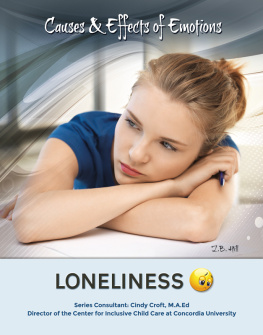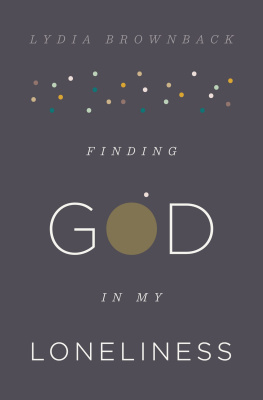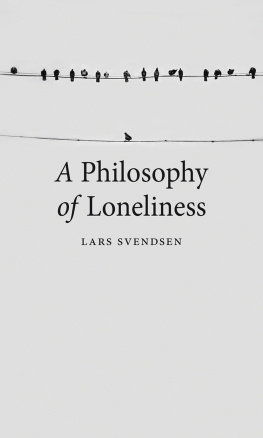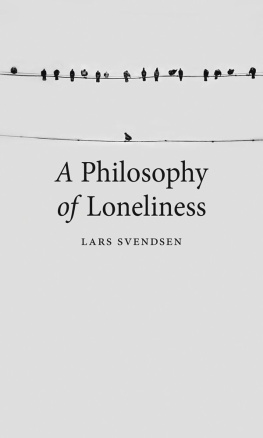Feeling Lonesome
The Philosophy and Psychology of Loneliness
Ben Lazare Mijuskovic

Copyright 2015 by Ben Lazare Mijuskovic
All rights reserved. No part of this publication may be reproduced, stored in a retrieval system, or transmitted, in any form or by any means, electronic, mechanical, photocopying, recording, or otherwise, except for the inclusion of brief quotations in a review, without prior permission in writing from the publisher.
Library of Congress Cataloging-in-Publication Data
Mijuskovic, Ben Lazare.
Feeling lonesome : the philosophy and psychology of loneliness / Ben Lazare Mijuskovic.
pages cm
ISBN 978-1-4408-4028-9 (hardcopy : alk. paper) ISBN 978-1-4408-4029-6 (ebook) 1. LonelinessPhilosophy. 2. LonelinessPsychological aspects. 3. Consciousness. I. Title.
B105.L65M537 2015
128dc23 2015008847
ISBN: 978-1-4408-4028-9
EISBN: 978-1-4408-4029-6
19 18 17 16 15 1 2 3 4 5
This book is also available on the World Wide Web as an eBook.
Visit www.abc-clio.com for details.
Praeger
An Imprint of ABC-CLIO, LLC
ABC-CLIO, LLC
130 Cremona Drive, P.O. Box 1911
Santa Barbara, California 93116-1911
This book is printed on acid-free paper 
Manufactured in the United States of America
To Ruth: My constant companion for fifty yearswhen I am with her, I am never lonely.
Each man is like a nautilus, who lives in a house of his own making, and carries it around on his back.
Brand Blanshard, The Nature of Thought
Contents
Introduction
Every human being who attains 16 years of age becomes her or his own philosopher and psychologist. Each and every one of us early on formulates general rules about (1) what exists, the difference between what is real and what seems, and how stones and thoughts are different from each other (metaphysics, ontology); (2) what can be known and what cannot, whether rational arguments are more persuasive than experience, or whether anything can be known at all; indeed, perhaps all is appearance and reality is unknowable (epistemology); (3) whether the standard of goodness is absolute and the same for everyone or whether it is relative and subjective and varies from culture to culture and person to person (ethics); and (4) what motivates human beings, how, and why (psychology). During the course of this study, I shall commit myself to a set of ultimate first principles, basic assumptions, or unquestioned premises in the areas I have just outlined that can be challenged readily by others of a contrary persuasion. These defining principles fall between a number of metaphysical choices: (1a) materialism, which posits that all reality is reducible to matter plus motion; (1b) idealism, which fundamentally assumes that all existence is mental, mind-dependent, or spiritual, for without minds nothing could exist or be known; and (1c) dualism, which holds there are irreducible differences between physical objects and space as opposed to minds and thoughts and therefore both material and mental entities exist, although they seem to share nothing in common.
In addition, epistemological principles offer the following options: (2a) empiricism claims that all our knowledge is derived from prior sensations and experience, whereas (2b) rationalism holds that there are some pure concepts and truths that are known independently of sensation; and, meanwhile, in opposition to the two previous assumptions (2c) skepticism maintains that there are no truths at all and nothing can be known with certainty.
I alert the reader to the foregoing options because the commitment I have chosen supports a qualified version of dualism as well as a form of rationalism, which includes the notion of synthetic but a priori relations or more technically formulated, synthetic judgments a priori . By synthetic I mean a combination of two or more distinct but related concepts, and by a priori I intend that these concepts are intrinsically, that is, universally and necessarily connected. But I am fully aware that there are other choices in terms of both metaphysical and epistemic principles that might apply or appear more convincing to others. After pondering for many years the reality and the role of loneliness in human life, I have elected to make my case as best I can in what follows.
Questions surrounding what is reality, how we gain knowledge, and the relation of matter to mind are already manifestly present in Platos Divided Line passage in the Republic (Plato, 1966, pp. 509d511e), but they become profoundly disturbing by the time we reach Descartess Meditations on First Philosophy (Descartes, 1955) . The difficulty first becomes acute and eventually chronic because Descartes so radically distinguishes matter as extended and inert from minds as immaterial and active. For if this is truly the case, several troubling questions naturally arise. How can a mental substance know that an independent, material world exists beyond and apart from the self; how can nonphysical thoughts interact with physical objects; how can immaterial concepts copy, represent, or correspond to physical objects if they share no property in common; and, finally, how can the self have any knowledge or contact with other selves or minds if each mind is confined to its own sensations, feelings, thoughts, perceptions, or representations? If Descartes is right, absolute solipsism and loneliness inevitably follow.
After Descartes, two philosophers, Spinoza (1955) and Schopenhauer (1966), hold that there is only one substance but that it exhibits a double aspect. It displays both a mental and a physical attribute or nature; the first follows psychological laws and the second, physical laws. But in terms of loneliness, both thinkers are monists: There is only one universal substance, and consequently, the self is ultimately not real; its merely a mode of an all-encompassing infinite and eternal reality. But without a real self, loneliness is a contradiction in terms.
Very recently, Brian Greene, in The Elegant Universe , offers a very different answer and expresses his confidence that string theory, a form of materialism, consisting of a set of ten (or more) one-dimensional strings, can explain it all.
For the first time in the history of physics, we therefore have a framework with the capacity to explain every fundamental feature upon which the universe is constructed. For this reason, string theory is sometimes described as possibly being the theory of everything (T.O.E.) or the ultimate or final theory. These grandiose descriptive terms are meant to signify the deepest possible theory of physicsa theory that underlies all othersand that in principle absolutely everything, from the big bang to daydreams, can be described in terms of underlying microscopic physical processes involving the fundamental constituents of matter. (Greene, 2000, pp. 1617)
My own preference for a theory of everything is rather grounded in something David Hume argues following Malebranche (Doxsee, 1916, pp. 692710). If causes and effects are distinct concepts; and what is distinct is separable; and what is conceivable without contradiction is possible; then it follows that anything is empirically imaginable; a pebble could extinguish the sun; biting into an apple could turn it into a puff of smoke; or, under certain material conditions, an immaterial thought could emanate or spontaneously erupt from a physical base. As Hume proposes, reason, as distinguishd from experience, can never make us conclude, that a cause is absolutely requisite to every beginning of existence ( Treatise, I, XIV, Of the idea of necessary connection ); and further, that Anything may produce anything. Creation, annihilation, motion, reason, volition; all these may arise from one another, from any other object we can imagine (I, XV, Rules by which to judge causes and effects [Hume, 1973]). Consequently, my conviction is that there are contingent creations in the universe and, under certain circumstances, material conditions not only may but actually do produce immaterial thoughts, as I argue in Contingent Immaterialism (Mijuskovic, 1984). Generally speaking, thinkers who posit the nonphysical nature of thought and mind are concerned to conclude with the souls immortality. But this is not a necessary conclusion, and it is certainly not mine; one can assert the former without drawing the latter inference and implication.
Next page










